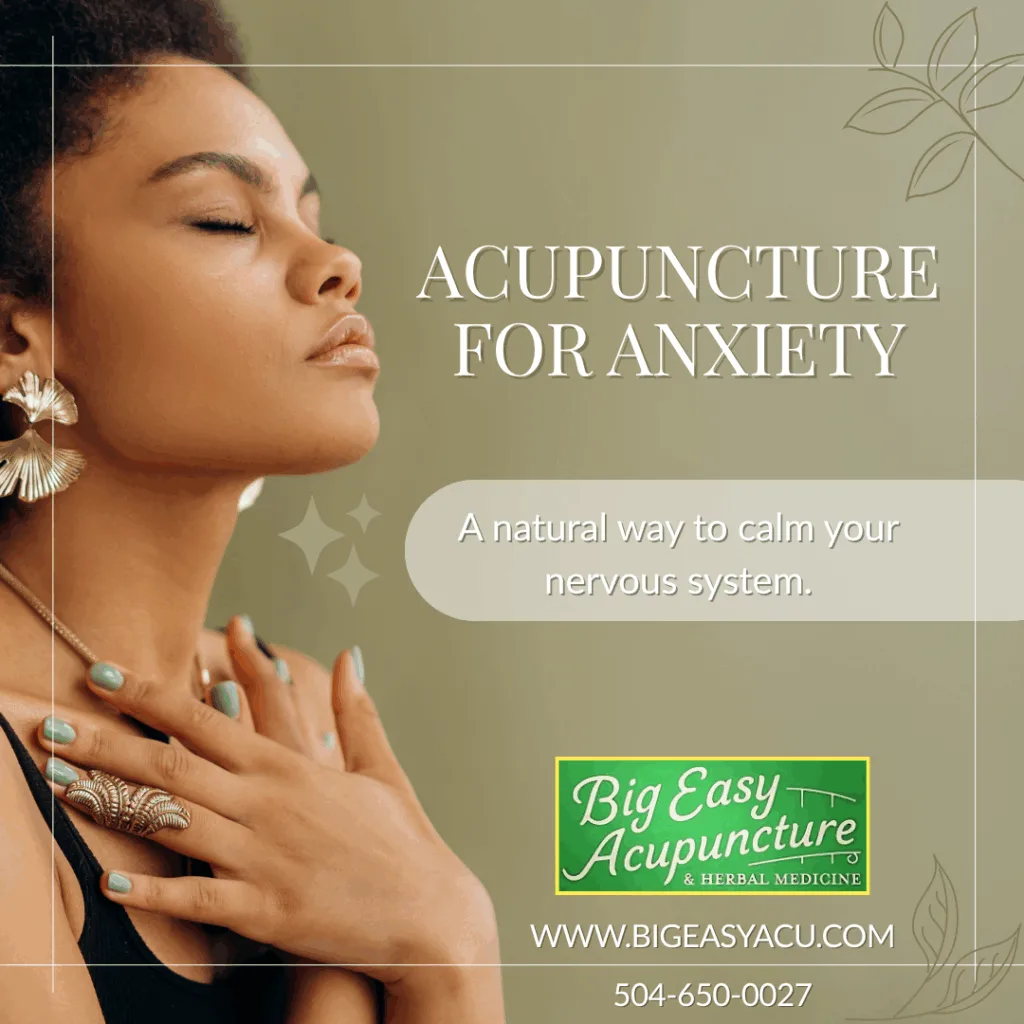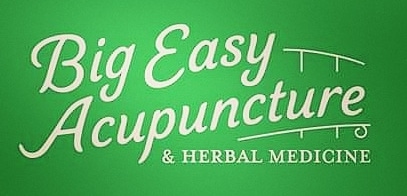 Acupuncture for Anxiety in Metairie, LA | Big Easy Acupuncture
Acupuncture for Anxiety in Metairie, LA | Big Easy Acupuncture
Acupuncture offers a safe, natural, and evidence-based approach to help reduce anxiety, regulate stress hormones, and restore calm to your nervous system.
Feeling anxious from work, health, family, or life changes is normal. But when worry, tension, and fear start to affect your sleep, focus, relationships, or ability to function, it can feel overwhelming.
You’ve probably tried to manage it on your own with deep breaths, mindfulness, or just pushing through, but it still feels like these feelings won’t turn off. You’re not alone, and it doesn’t mean you’re broken. Your system just needs help remembering how to relax again.
Anxiety disorders are among the most common mental health concerns in the U.S., affecting tens of millions of adults each year. Many people use counseling and medication, and are also looking for safe, natural options to support their nervous system.
Many of our patients are busy professionals or caretakers whose minds never stop running. If you’ve tried counseling, supplements, or breathing techniques and still feel wired, acupuncture offers a different kind of nervous system reset.
At Big Easy Acupuncture & Herbal Medicine in Metairie, we use acupuncture, herbology, and other Traditional Chinese Medicine (TCM) techniques to help calm the body, support the brain, and improve overall resilience so anxiety is easier to manage day-to-day.
What Is Anxiety?
Anxiety is a general term for several disorders that have common symptoms – such as nervousness, worrying, apprehension, and fear.
Anxiety can show up in different ways, such as:
- Constant worrying or feeling “on edge”
- Trouble relaxing or sleeping
- Tight chest, racing heart, or shallow breathing
- Irritability, restlessness, or difficulty concentrating
- Panic attacks or sudden waves of fear
- Avoiding people, places, or situations
Common diagnoses include:
- generalized anxiety disorder (GAD)
- Phobias
- Panic disorder
- Social anxiety
- Post Traumatic Stress Disorder (PTSD)
- Obsessive Compulsive Disorder (OCD)
- Anxiety associated with Parkinson’s disease
- Anxiety related to other conditions like chronic pain
You don’t need an official diagnosis to seek help. If anxiety is getting in the way of how you want to live, you’re in the right place.
The Traditional Chinese Medicine (TCM) Perspective on Emotions and Organ Balance
In TCM, brain chemistry and organ systems are seen as interconnected. Each emotion corresponds to an internal organ system:
- Excess Worry affects the Spleen
- Excess Grief affects the Lungs
- Excess Anger affects the Liver
- Excess Fear affects the Kidneys
- Excess Lack of Joy affects the Heart
Prolonged emotional strain along with lifestyle, diet, or environmental stress, can disrupt this balance, creating both physical and emotional symptoms that contribute to anxiety.
These connections aren’t meant to replace science. They simply show how emotions and the body influence one another. When your organs and nervous system are in balance, emotions feel more stable and easier to navigate.
How Acupuncture Helps Anxiety
Acupuncture is a form of medicine that uses very fine, sterile needles to stimulate specific points on the body. It helps regulate the nervous system, improve circulation, reduce pain and inflammation, and support the body’s natural healing processes.
Modern research suggests acupuncture can help reduce anxiety symptoms by acting on the nervous system, hormones, and brain chemistry:
- Encouraging release of natural “feel-good” chemicals (like endorphins/dopamine/serotonin)
- Modulating stress hormones such as cortisol
- Influencing brain regions involved in mood and emotional regulation
- Shifting the body out of “fight or flight” and into a more restful, regulated state
A large systematic review of randomized controlled trials found that acupuncture was associated with meaningful reductions in anxiety symptoms compared with control or sham treatments.
In simple terms: acupuncture helps your body shift gears from wired and tense to calmer and more regulated.
Examples of Acupuncture Points Used for Anxiety Support
While each treatment is personalized, certain acupuncture points are commonly used to support nervous system regulation, relaxation, and emotional balance.
Some of these points include:
- Yintang (Third Eye Point) – Located between the eyebrows, this point is often used to promote relaxation, ease mental tension, and quiet racing thoughts.
- Shenmen (Heart 7) – Found on the wrist, this point is traditionally used to help calm the mind, support emotional balance, and improve sleep quality.
- Pericardium 6 (Neiguan) – Located on the inner forearm, this point is commonly used to help regulate the heart and nervous system and may ease symptoms such as palpitations, chest tightness, or nausea related to anxiety.
- Stomach 36 (Zusanli) – Located below the knee, this point supports overall resilience and vitality and is often used when anxiety is accompanied by fatigue, digestive issues, or low energy.
- Auricular (Inner Ear) Acupuncture Points – Certain acupuncture points on the ear are commonly used to support nervous system regulation. These points are selected to help influence vagus nerve tone and balance the body’s stress response, supporting relaxation, emotional regulation, and overall autonomic nervous system function.
Not every patient receives the same points. Point selection is based on your symptoms, medical history, nervous system patterns, and how your body responds over time.
What Anxiety-Focused Treatment Looks Like Here
At Big Easy Acupuncture, anxiety sessions are not “cookie cutter.” We look at how your stress shows up in your whole body, including:
- Energy and sleep
- Muscle tension, pain, or headaches bringing stress/anxiety from the long standing issues
- Digestion, appetite, thirst
- Breathing patterns and chest tightness
- Hormonal changes or life transitions
- Medical conditions and medications you’re already using
- Lifestyle (How do you spend your time, stress triggers, discussion of hobbies)
What a Session Feels Like
When you come in, the room is quiet with white noise to help your mind settle. We will discuss together your goals and then after discussion we will move into the acupuncture session,
Needle sensation is usually minimal – you may feel a slight pinch or tingle upon the insertion of a needle that dissipates quickly. Many patients become deeply relaxed or fall asleep with the needles retained for treatment.
Once the needles are placed, you rest while your nervous system shifts from high alert into deep regulation. Many patients describe this phase as their body finally letting go without forcing it. The needles are normally retained for 15-20 minutes while your body relaxes.
What to Expect at Your First Visit
During your first visit we will:
- Review your health history, medications, and symptoms
- Talk about your anxiety triggers and patterns
- Check areas of tension like the neck, jaw, shoulders, chest, and diaphragm
- Create a treatment plan that fits your presentation
- Begin treatment
A treatment may include:
- Acupuncture points to calm the nervous system
- Points to ease muscle tension, headaches, or digestive upset
- Cupping, guasha, or bodywork
- Breathing and body awareness coaching
- Herbal or lifestyle suggestions
How Many Treatments Will I Need?
Everyone is different, but a common plan for anxiety is:
- Acute or recent anxiety:
1–2 visits per week for 3–4 weeks, then taper as symptoms improve.
- Long-standing or complex anxiety (with pain, insomnia, or chronic illness):
A longer course such as 8–12 weeks, with progress checks as we go.
Treatment plans are customized to meet the needs of each individual based upon presentation.
Research trials that showed benefit for anxiety often used 8 or more sessions, usually once or twice per week.
Herbal Medicine for Anxiety Support
In addition to acupuncture, herbal medicine can play an important role in supporting your anxiety recovery. Chinese herbal medicine can be used alongside acupuncture to help calm the mind, regulate energy, and improve sleep.
At Big Easy Acupuncture, formulas are customized based on your presentation and adjusted week to week as you progress.
Anxiety, Pain, and the Rest of Your Body
Anxiety rarely shows up alone. It may come with:
- Chronic pain (neck, back, headaches, TMJ)
- Sleep problems or insomnia
- Digestive issues (IBS, nausea, loss of appetite)
- Hormonal changes, hot flashes, or life transitions
- Sexual dysfunction
- Long-term illness, such as cancer or Parkinson’s disease
Prolonged or excess anxiety leads to a higher nervous system tone which will lead to:
- Reduced blood flow
- Higher muscular tensions
- Nerve entrapments due to tension leading to pain, mobility, or strength issues
Because acupuncture treats the whole system, we can often help address both the emotional and physical sides at the same time.
What Patients Often Notice
After a few sessions, patients frequently describe:
- Feeling calmer and more grounded
- Sleeping more deeply
- Less tension in the neck, shoulders, chest, or areas tension is normally held
- Fewer headaches
- Improved digestion and energy
- A greater sense of control over daily stress
- A steady, balanced emotional state rather than reactive anxiety
If you’re ready to feel calmer, sleep better, and get your energy back, you don’t have to keep managing it alone. Acupuncture helps your body remember how to find balance again.
Frequently Asked Questions (FAQ):
How does acupuncture help with anxiety?
It influences the nervous system and brain chemistry. It can lower stress hormones, release endorphins, and activate the rest-and-digest response.
Is acupuncture a substitute for therapy or medication?
No. Acupuncture can complement other treatments such as therapy, counseling, or prescribed medications. Many patients find that acupuncture enhances their results by reducing physical tension and emotional overwhelm, making it easier to engage in other forms of care.
Is acupuncture safe for people with anxiety or panic attacks?
Yes. When performed by a licensed practitioner, acupuncture is considered very safe. Needles are sterile and single-use, and most people find treatment deeply relaxing. Mild soreness or lightheadedness afterward is rare and temporary.
How many sessions will I need before I feel better?
Every patient is unique. Some notice improvement after just one or two sessions, while others need several weeks of consistent care. Research studies showing significant anxiety reduction typically involved 8 or more treatments over 4–8 weeks.
Can acupuncture help with anxiety-related insomnia or physical symptoms?
Absolutely. Anxiety often affects sleep, digestion, and muscle tension. Acupuncture helps calm the nervous system, improve sleep quality, relax tight muscles, and ease symptoms like chest tightness, headaches, or stomach discomfort that often accompany anxiety.
How long do the effects last?
Many people feel calmer for hours or even days after a session. Each treatment builds on the previous visit. This leads the body to stay in a new state rather than reverting back to having the issues it had previously. Regular treatments help retrain the nervous system to stay in a more balanced state, leading to longer-lasting relief over time.
Anxiety Treatment at Big Easy Acupuncture in Metairie
If you’re ready to explore acupuncture as part of your anxiety care:
- Location: Big Easy Acupuncture & Herbal Medicine – Metairie, LA
- Scheduling: Easy online booking 24/7 at bigeasyacu.com
- Care style: one-on-one sessions focused on nervous system regulation, pain, strength, mobility, and long-term resilience
Why choose Big Easy Acupuncture for Anxiety Care
-
-
- Specialized in nervous system regulation and pain management
- One-on-one hands-on treatments in a quiet, private setting
- Customized plans combining acupuncture, herbs, and lifestyle support
- Convenient online scheduling and flexible hours
- Licensed Acupuncturist with advanced training in Sports Medicine Acupuncture and Traditional Chinese Medicine
- Custom herbal blends to continue stress and anxiety treatments outside the clinic.
Feel Right. Move Free. Live Easy.
Let’s help your nervous system finally exhale.
Evidence Summary
Modern research supports acupuncture as a safe and effective complementary approach for managing anxiety. Studies show it helps regulate stress hormones like cortisol, release natural endorphins, and influence brain regions involved in mood and emotion. Multiple randomized controlled trials and meta-analyses demonstrate significant improvements in anxiety symptoms compared with control or sham treatments. While results vary by individual, acupuncture consistently shows benefits for both physical tension and emotional regulation, making it a valuable addition to comprehensive anxiety care.
References
- Gao, Y., Wang, Y., Liu, Z., et al. (2021). Acupuncture for Generalized Anxiety Disorder: A Systematic Review. Frontiers in Psychiatry, 12, 784756. Source: National Center for Biotechnology Information (NCBI / PMC).
- Healthline Editorial Team. (2023). Acupuncture for Anxiety: How It Works, Benefits, and Risks. Source: Healthline.
- Henry Ford Health. (2020). Get the Most Out of Acupuncture for Anxiety. Source: Henry Ford Health Blog.
- Memorial Sloan Kettering Cancer Center. (2022). Acupuncture for Neuropathy, Cancer Pain, Anxiety, and More. Source: MSKCC.org.
- Evidence Based Acupuncture. (2023). Acupuncture and Anxiety: What the Research Says. Source: EvidenceBasedAcupuncture.org
- Nebraska Medicine. (2022). Acupuncture Treatment for Depression and Anxiety. Source: NebraskaMed.com.
- JAMA Network Open. (2022). Effect of Acupuncture vs Sham Acupuncture on Psychological Distress Among Patients with Anxiety or Depression: A Randomized Clinical Trial. Source: JAMANetwork.com.

 Acupuncture for Anxiety in Metairie, LA | Big Easy Acupuncture
Acupuncture for Anxiety in Metairie, LA | Big Easy Acupuncture Acupuncture for Stress | Big Easy Acupuncture, Metairie LA
Acupuncture for Stress | Big Easy Acupuncture, Metairie LA Quit Smoking / Quit Vaping | Big Easy Acupuncture, Metairie LA
Quit Smoking / Quit Vaping | Big Easy Acupuncture, Metairie LA
